Our editors share their recommendations for books to enjoy over the summer break
Lacey Dunham, fiction editor
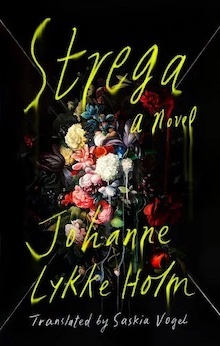
The narrator in Johanne Lykke Holm’s novel Strega (Riverhead, 2022), translated from the Swedish by Saskia Vogel, is sent by her parents along with eight other girls to a remote resort hotel in the Italian alps. The girls are on the cusp of womanhood, and the hotel is where they perfect their performances of subjugation and servitude as they prepare for lives as wives and mothers: cleaning, laundering, making bed, preparing food—all for guests who never arrive. The girls are free to leave at any time, but they never do. That is, until one, Cassie, goes missing. Is Cassie’s disappearance an act of agency or of foul play? Strega refuses to answer the question, and the girls are somewhat unfazed by Cassie’s vanishing.
The title, left untranslated, is the Italian word for “witch.” The girls in their secluded mountain life—temporary though it is—could be read as a coven, their latent power just beneath the surface. Witch can also be an accusation, a means of undercutting women’s power, often through aggression and force. What sets Strega apart is how it avoids black and white thematic determinations. The novel opens with an explicit (and startling) imagery of women’s bodies as crime scenes, but makes clear that the girls living in the mountain resort are complicit in that violence. Strega is eerie and memorable, wrestling with the ways women are both objects and subjects in patriarchal cultures.
+
Diane Josefowicz, book reviews editor
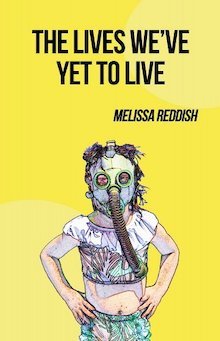
In The Lives We’ve Yet to Live (Tailwinds Press, 2022), Melissa Reddish opens a gritty window on a near-future dystopia where Americans evade death by running back their biological clocks. This wish-come-true has paradoxical effects: as people renew their lifetimes, the population explodes, making essential resources scarce and expensive; life is all but unlivable for ordinary people. Reincarnations are then limited to three per person, and the regulation creates a thriving market arises for unwanted surplus years, but these responses are both insufficient and bring unexpected consequences of their own. At the novel’s center is middle-aged Virgil and his daughter, Phoenix, who are struggling with the familial riptides produced by a child’s growing up and leaving home. As they seek ways to support each other, what emerges is a moving portrait of two ordinary people fighting to stay close to each other and in touch with their humanity in a deeply strange and dehumanizing society not all that different from our own.
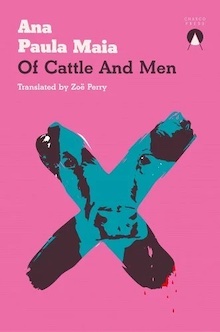
Most of the action in Ana Paula Maia’s Of Cattle and Men (Charco, 2023) translated by from the Portuguese by Zoë Perry, takes place in and around a remote Brazilian slaughterhouse downstream from a fouled river, the shores of which are lined with tiny crosses. The cows are behaving strangely, but no more than those look after them. Caught in this landscape of fulminant madness, Edgar Wilson, a cattle whisperer, leads his cows into the stun box and slaughters them with an expertly placed whack to the head. Both herd and team are losing their wits for reasons that are mysterious but may be related to the recent opening of a hamburger plant up the road. In Maia’s hands, this unpromising setting becomes the site of compelling existential mystery and uncanny violence. The novel’s characters, trapped by circumstance and their own imaginations, are always listening for the echoes those who’ve escaped: “the murmur of those who never returned echoes against the rocks, a lamentation, because when there is no one to pray, the rocks cry out.”
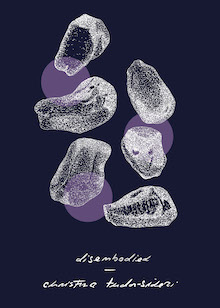
The narrator of Disembodied, a dazzling short novel by Christina Tudor-Sideri (Sublunary Editions, 2022) is almost but not quite dead—and that may be the least important thing to know about her. As the book begins, the narrator, a woman who is expiring, flat on her back, in a garden somewhere between the Danube to the Black Sea, reports that “I died on the twelfth of September, at the height of happiness”—because, of course, she has died reading. What a way to go! As her final book slides from her hands, she begins her own story of how a deeply literary life comes slowly to an end. She peppers her confession with references to what she has read, which seems to be everything in the rich library of modernism from Proust to Blanchot, but the references never feel arbitrary or forced because she comes at these writers from an angle that’s uniquely her own. Meandering from subject to subject—time, memory, eros, bodies, cities—she reveals herself to be an interesting philosopher and a better companion, a generous dispenser of witty and self-aware asides. One mordant line, on postmortem loquacity, made me laugh out loud: “I wish I knew when the complete and irremediable loss of brain function occurs, and where the words go after such a moment, especially when, by miracle or fortune or mere haphazardness, they happen to still be flowing from the mouth.”
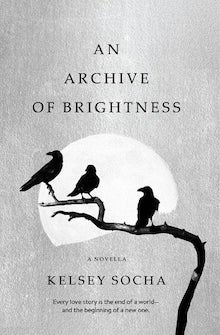
I see now that I’ve done a contrary thing, by focusing on novels that might seem grim in contrast to the usual beachside fare, so in closing I’ll recommend a pure shot of tender joy. Kelsey Socha’s An Archive of Brightness (Lanternfish, 2022) is a gorgeously imagined story of witnessing, in which a parliament of crows—crows!—pays minute attention to human moments of enormous vulnerability that might be otherwise denied or refused. These are moments of full hearts and enormous vulnerability: a pair of quiet lobstermen seek ways to express their mutual affection; two girls fall in love, holding hands, on a bench in Vermont. Socha imbues her novel with the delicious sense that something wonderful is always happening or about to happen, if you just take the time to look, to notice, and to remember, as the crows do.
+
Steve Himmer, editor
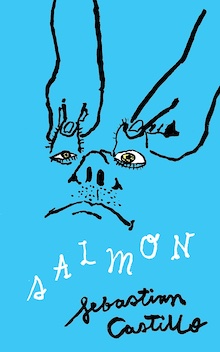
I’ve been traveling for work during much of the summer, leading a study abroad course, but before leaving home I read Sebastian Castillo’s novel Salmon (Shabby Doll House) which follows a narrator whose travels didn’t go as smoothly as my own. The book opens, “My resolve was simple: to say no to the dailiness of life,” and page after page the protagonist fulfills that Thoreauvian ambition on his quest to become a poet of nature. Salmon is picaresque and absurd, like the best trips, and carries its complexity and intelligence lightly in a way I admire.
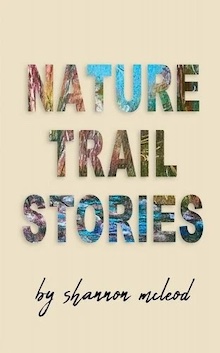
While hiking lately I’ve been thinking about Nature Trail Stories (Thirty West Publishing House), a collection by Shannon McLeod, in which characters repeatedly move into liminal spaces. A walk in the woods creates a distance between the life we need to return to in just a short while and the animal freedom we might long for — and which McLeod’s characters do — however impractical it would be to run away into the wild. Sitting in those moments of possibility with her characters, saying no and not yet for a moment to the decisions they need to make and the questions about their lives and their circumstances that need to be answered, felt like the way summer at its best moments — especially when I get outdoors — can be a breather from the rest of the year.
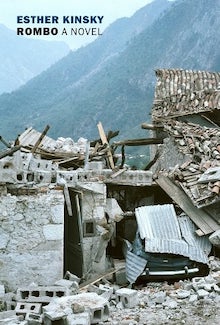
And lately I’ve been reading Rombo by Esther Kinsky, translated from German by Caroline Schmidt. It’s about the legacy of two 1976 earthquakes on a region of Italy I recently explored with my summer students. The book’s slow, steady attention and rich layering of personal tragedy, history, landscape, geology, and nature was a haunting map to explore the area with and and I felt my understanding of the place expanding as I looked up from the pages to mountains around me.